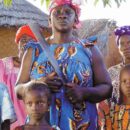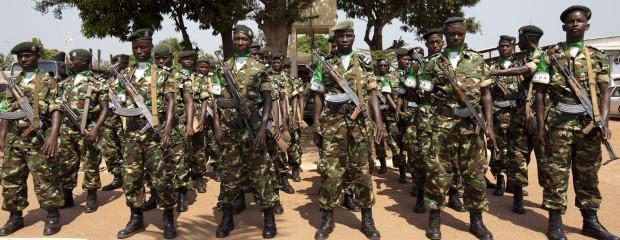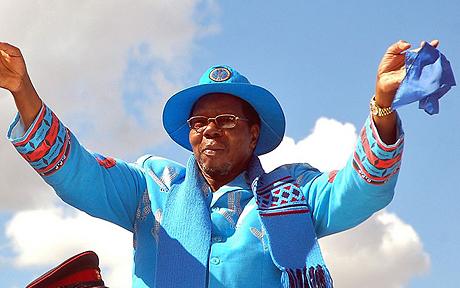“Oh, dis Ebola business!” Thoughts on current responses to the virus – By Pippa Page

 “Oh, dis Ebola business!” was a familiar exclamation in Sierra Leone’s Krio language during my time in Sierra Leone’s second city, Bo, this summer. Sierra Leone was the last of the three West Africa nations to confirm a case of Ebola, but it has arguably been hit the hardest in terms of numbers. The reality of Ebola is ghastly, unsettling and above all, scary, and its impact on the country has run along some familiar fault lines in Sierra Leonean society: namely deep mistrust in the authorities, outsiders and the healthcare system. But so far, the international community’s response to the crisis has not gone any further than reflecting their own self-interest.
“Oh, dis Ebola business!” was a familiar exclamation in Sierra Leone’s Krio language during my time in Sierra Leone’s second city, Bo, this summer. Sierra Leone was the last of the three West Africa nations to confirm a case of Ebola, but it has arguably been hit the hardest in terms of numbers. The reality of Ebola is ghastly, unsettling and above all, scary, and its impact on the country has run along some familiar fault lines in Sierra Leonean society: namely deep mistrust in the authorities, outsiders and the healthcare system. But so far, the international community’s response to the crisis has not gone any further than reflecting their own self-interest.
In the early days, when cases were largely confined to Kailahun district on the Guinean border, public information on Ebola consisted of the odd public health poster and a looped cry of “EBOLA IS REAL” emanating from a speaker system placed in the middle of one of Bo’s roundabouts. It was hardly convincing in an environment where deep suspicion of the existence of the virus was commonplace: many spoke of it in in the same terms as HIV/AIDS – as an imported, foreign disease. On a couple of occasions chants of “˜Ebola, Ebola!’ would follow me and my UK colleagues down the street. Given that the symptoms of malaria and other tropical illnesses are near-identical to those of Ebola in the initial stages, the idea of outsiders proclaiming the presence of some new and deadly disease was met with scepticism.
Without reliable information from the authorities, fear, panic and rumour took hold, spreading at a far faster rate than the disease itself. Chinese whispers ranged from the wild (a political conspiracy from the ruling APC to disrupt the SLPP’s stronghold in the south and east) to the dangerous (ingesting popular skin bleaching creams or even bleach itself will kill Ebola bacteria). The “˜mystery’ and rumour behind Ebola translated quickly into a sense of violation and anger: aid workers arriving to do sensitisation work were driven out of communities, in one case having rocks thrown at their vehicles. During one of my routine sessions in a local primary school on hygiene awareness, panicked parents descended on the school in order to remove their children, after hearing rumours earlier that morning that health workers were coming to inject pupils with Ebola itself.
When preventative messages from the authorities finally began to trickle down, little attention was paid. In a country where corruption and a lack of transparency have underlined many aspects of life for as long as people can remember, government advice is not often taken too seriously. The government’s slow response to declare an emergency, shut off borders and close roads was indicative of its own attitude of denial. Even in mid-July, Health Minister Miatta Kargbo was reported as saying the outbreak was “˜serious, but not an emergency’.
Ebola has reinforced a deep-rooted mistrust of healthcare institutions among the population. Public health provision is chronically under-resourced in Sierra Leone – if you can even access it in the first place. Nor can many people afford the most basic level of hospital treatment. Such was the panic and lack of information at every level of society, including doctors and nurses, that it was thought if you turned up at a government hospital presenting fever and diarrhoea no one would touch you.
Many health professionals, who have never been trained to deal with anything comparable to Ebola, and are hardly incentivised by the pitiful salaries they take home, refuse to work in isolation units. I heard of terrified hospital staff leaving their positions and fleeing the hospital when a suspected case turned up: an understandable impulse, in the midst of such panic. Seeing health workers in “˜space suits’ and the steady stream of sick people entering, never to emerge again, it is little wonder than many people believe it is the hospitals that will kill them, rather than the virus itself. It is against this backdrop that people choose to rely on traditional healers and “˜manage’ the disease in-community.
With a completely overwhelmed healthcare system, barely a day goes by without a plea for help from the international community. In the aftermath of its bloody 11-year civil war, which came to an end in 2002, Sierra Leone’s over-reliance on foreign donors has become acute. In terms of getting back on its already shaky feet, Ebola has set the country back yet again, demonstrating the state’s inability to manage a crisis and reinforcing the general population’s lack of trust in the government and its institutions. The economic impacts are also being keenly felt, with food prices hugely inflated. Charities like MSF and the Red Cross are fundamental to the equation. At the same time, the visible exodus of many foreign NGOs because of Ebola sends a negative message that we will abandon ship with things get tough. Foreign countries pulling up the drawbridge and major airlines suspending flights only add to the sense that no one really wants to touch West Africa right now.
And now, finally, Ebola has reached UK shores – making front page news for the first time since the crisis began earlier this year. Since Will Pooley’s hospitalisation in London, discussion has focussed on dispelling panic that the well-equipped and prepared UK could now find itself fighting the spread of a deadly African disease; which is a rather convenient distraction from the issue of how we can help to fight the spread of Ebola across chronically under-resourced West Africa.
The West’s response to the crisis has come too little too late for it to look like anything other than the international community protecting itself. MSF has criticised the global response as “˜practically zero’. It remains far too easy for foreign leaders to think about Ebola as an “˜African problem’ which the West cannot help solve, especially if our people are going out there and catching it too.
But Will Pooley’s family were right in asking people “to remember those in other parts of the world suffering with Ebola who do not have access to the same healthcare facilities as Will”. Ebola’s impact on West Africa so far has been devastating. In Sierra Leone it has not only killed hundreds of people, but plunged an already fragile nation into deep fear and paranoia. Without an unprecedented response from the international community, the crisis will get far worse before it gets better.
Pippa Page has recently returned from Bo, Sierra Leone.







Perhaps a better term could have been found than “Chinese whispers”?
An excellent article – lucid, thoughtful, sensitive and compelling.
Mo: I think the term “Chinese whispers” is very apt. It conveys the situation where information is passed on and misinterpreted or misunderstood at every new level – whether by accident or intentionally – very well. It is an accurate description and indeed the sad truth.